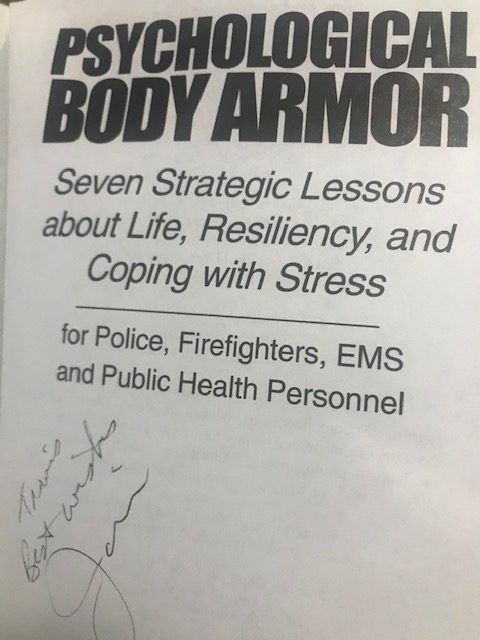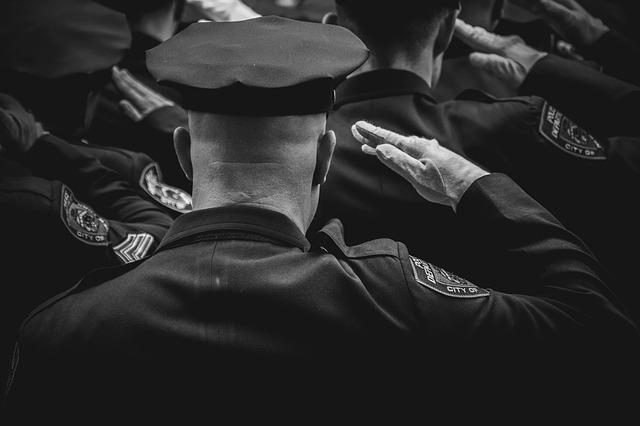I believe strongly in the saying that “leaders read” and while I try to practice that mantra, I’ve been more of a collector of books in recent years. I can’t seem to catch up with the books I have and that collection has grown far beyond a few book shelves. My recent acquisitions are located in two places that I frequent every week, my department office and my business office. But every so often, I find a gem that has been hidden away in places I rarely visit.
Yesterday was one of those days. I was digging in my garage for some things that my kids surely lost (not me) when I saw a book titled “Psychological Body Armor” by Dr. George Everly and Dr. James Reese. The title caught my attention as I teach a course called “The Resiliency Code” that focuses on the responsibilities of leaders to ensure that law enforcement professionals not only survive, but thrive.
I dusted off the book this morning and opened it up and saw the inscription by Dr. Reese. Reese, a master criminal profiler began his career in the FBI Behavior Analysis Unit and his accomplishments would literally blow out this server so you can check them out for yourself.
I met Dr. Reese several years ago but finding his book was important because it solidifies what I tell leaders across the country.
Leave A Legacy
Leaders must dedicate their time and effort to leaving a legacy behind. Each of us standing today, do so based on those before us and if we do this thing called leadership correctly, you have the opportunity to lead for generations. Finding this book, that is now out of print, was a prime example of that.

Through the efforts of Dr. Reese (and Dr. Everly), they continue to help others with the effort they put into this excellent resource. I’ve been studying the issue of resilience for a decade. I have countless books on the topic and I’m in front of audiences on a regular basis discussing the issue and I have spent the entire morning listening to Dr. Reese through these pages.
That’s legacy and we can all do that!
Leadership Is Everything
As I combed the pages of the book, I was quickly inspired by what the authors say and in particular what was said about leadership. You may ask yourself what does leadership have to do with a book on resilience?
Leadership has everything to do about everything.
I’ll admit that at times, I’m a “cheat reader.” I went to the table of contents and found the sections that I had time to digest before the day got crazy and I turned to one of my favorite topics, resilience.
The book discussed “resistance” and “resilience.” Resistance is the ability of an individual or group to resist the negative effects of stress while resilience refers to those that can quickly rebound from stress.
There are other details but under both definitions, a long list of behaviors or situations were listed that were identified as precursors to enabling resistance or resilience. You are likely aware of many of them: stress training, plenty of sleep, group identity, health and fitness, etc.
But under both lists, there was one common concept that was identified to “enhance” resistance or resilience. Here are the exact words from the book:
The following may serve to enhance resistance (10 items)
Perception of credible and competent leadership
The following may serve to enhance resilience (12 items)
Effective leadership
Here are two of the world’s leading experts discussing stress management and at the top of this, the most important aspect needed was leadership. I find that absolute amazing and of course it is more true today than ever.
I hear from cops every day that love their job and they love serving the community but they are leaving because of leadership or the lack thereof. I’ve been in front of thousands of law enforcement professionals in the last 24 months and I rarely hear any complaints about criminals, crime or activists.
It’s always about leadership.
Indeed, everything and I mean everything is about leadership!
Stay Courageous and Lead!
Travis Yates is the author of “The Courageous Police Leader.” His training events along with additional resources can be located at: www.travisyates.org.

